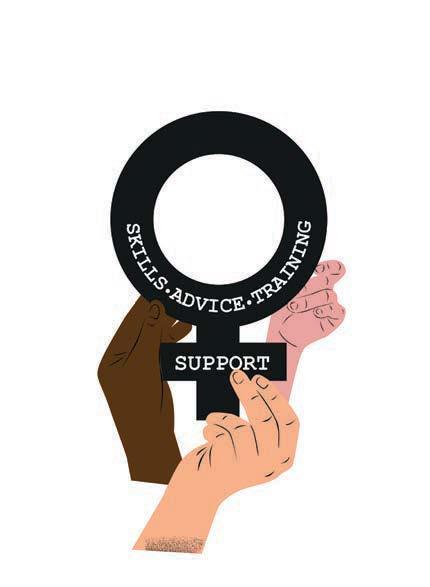
3 minute read
How you can become a Women’s Centre Champion
Words: Narinder Panesar and Jo Halford Illustration: UP STUDIO
In the last edition of the magazine, we introduced you to the Creating Community Connections (CCC) project, set up to help women in prison to access specialist services. In this article, CCC Coordinator Narinder shares information about the role of Women’s Centre Champions, the support and help they provide, and how you can become one.
Advertisement
T he CCC’s project vision is that every woman in prison (whatever the length of their sentence) is connected to specialist services and their local women’s centre. Our Women’s Centre Champions (WCCs) are there to help us achieve this.
Who are WCCs?
WCCs are women in prison trained to act as a point of contact to provide advice and guidance about women’s centres, what they do and what they offer, along with other resettlement processes and support available to women in the prison and the community.
What do WCCs do?
l They make sure you have a good understanding of all the services and agencies available to you and the processes required to get you referred on to them, supporting you in referrals l Run regular forums/workshops to promote the CCC project l Listen and talk to women in prison and prison staff about their experiences and discuss ways in which the prison environment can be improved l Advocate for women in prison, representing their views and making sure their voices are heard l Deliver activities to increase awareness about issues in prison, exploring the root causes of these issues l Plan and run events promoting personal growth l Attend training to support their own skills and work l Attend weekly meetings with other WCCs and the Women’s Centre Link Worker who coordinates WCC activities and training
Where are they?
At the moment we have two WCCs at HMP Foston; we are in the process of recruiting two at HMP Eastwood Park; and have received nine applications from the Link Worker at HMP Drake, which, following a security check, will go through to the interview process and then training if successful.
We aim to eventually have WCCs on all prison wings. Roles are currently advertised on Wayout , in lea ets on the wings, and in the library and education centre. Women in Prison have recruited two Women’s Centre Champions at HMP Foston who are providing training to WCCs.
How can I become a WCC?
You can apply to become a WCC by submitting an application to the Women’s Centre Link Worker at your prison; details of how to contact a Link Worker are displayed on prison wings and in the library and education departments. The Link Worker can provide you with more details about the role. Alternatively, you can fill in your details on a lea et – these are displayed on the wing – and hand it in to a Link Worker. You can also get in touch with your activities department or your Offender Management Unit worker.
We are looking for women who are able to offer both emotional and practical support, who can motivate someone e periencing difficulties to seek support. WCCs require patience and an ability to work with vulnerable and sometimes demanding people. You must feel comfortable in sharing information with peers and staff, and have an ability to work well with others, often using your own initiative. Good emotional awareness is essential in allowing you to offer support without having an impact on your own wellbeing.
What are WCCs o ered?
As a WCC you will be offered vocational training and ualifications opportunities, such as Peer Mentoring Level 1 and Peer Mentoring Level 2. You will also receive nonaccredited Women’s Centre Champions training. The career progression opportunities available are unpaid and/or paid employment in the community. WCCs also have opportunities to benefit from Release on Temporary Licence (ROTL) to local women’s centres.
Poem from a woman in HMP Foston Hall about her WCC
i a o en’ a ion S is full of useful knowledge S is kind i al a t ere el e o t i a e ial er on S is always on call i a g ar ian angel it b tter ing give e a lot o e l in or ation i all t e be t











